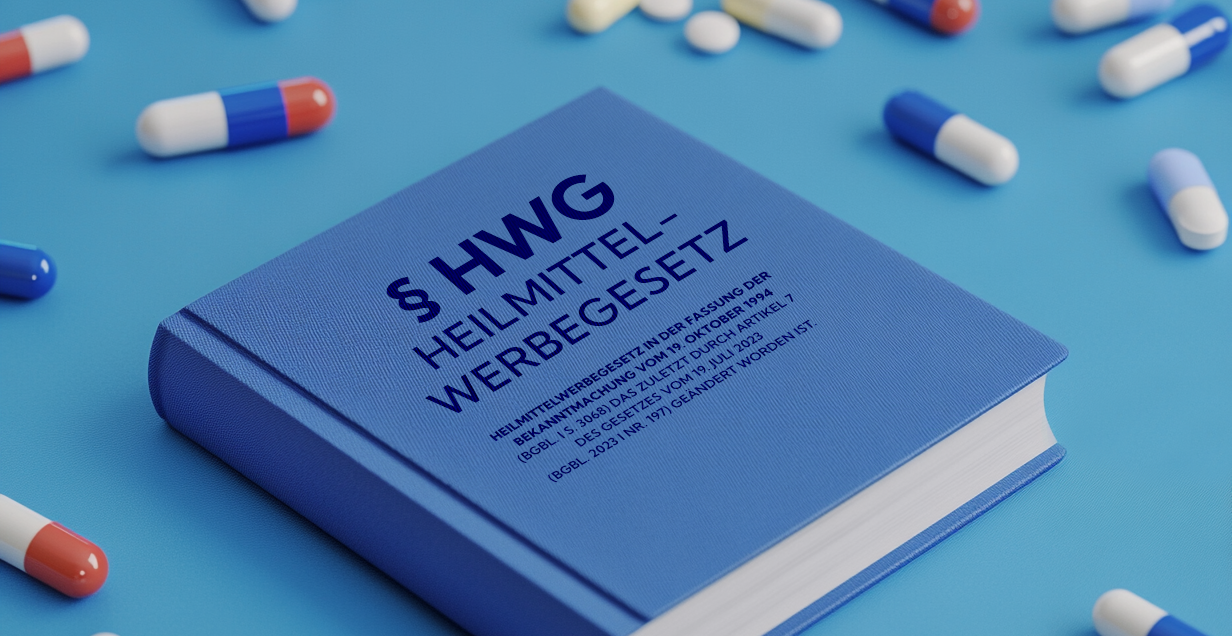German Drug Advertising Act – Advertising guidelines for the pharmaceutical and healthcare industry

Content
- What is the German Drug Advertising Act?
- Purpose and significance of the HWG for the healthcare market
- Important provisions of the German Drug Advertising Act for companies
- German Drug Advertising Act in the digital world
- Legal consequences of violations of the HWG
- Conclusion: HWG as the basis for serious healthcare advertising
What is the German Drug Advertising Act?
The German Drug Advertising Act (in German “Heilmittelwerbegesetz, HWG”) is one of the most important legal regulations in Germany for controlling the advertising of medicinal products, medical devices and therapeutic procedures. It was first introduced in 1965 and primarily serves to protect consumers from misleading or exaggerated advertising claims in the healthcare sector. The law ensures that information about remedies is communicated in a transparent, scientifically sound and factually correct manner.
The HWG plays a key role in the pharmaceutical and healthcare industry in particular, as companies must adhere to strict guidelines when advertising products and therapies. It supplements the German Medical Products Act (AMG) and the Unfair Competition Act (UWG) and ensures ethical standards in healthcare communication.
Purpose and significance of the HWG for the healthcare market
The main aim of the HWG is to protect public health and ensure that consumers and patients are not misled by advertising. Particularly in the case of medicinal products and medical treatments, advertising that suggests unproven healing promises or exaggerated effects can have serious consequences.
The HWG therefore regulates the following aspects in particular:
- Prohibitions on advertising prescription-only medicines to the general public
- Prohibition of misleading advertising claims and false promises of cure
- Restrictions on the presentation of effects and successes
- Regulations for testimonials, patient reports and expert opinions
- Strict rules for advertising in digital media, print and TV
The HWG is particularly important in the context of the pharmaceutical industry and healthcare advertising, as violations can be punished with warnings, fines or even legal proceedings.
Important provisions of the German Drug Advertising Act for companies
The HWG distinguishes between two main forms of health advertising:
1. Lay advertising (end consumer advertising)
Advertising aimed directly at consumers is subject to the strictest regulations. For example, it is prohibited to advertise prescription drugs or certain healing promises to the public.
Prohibited advertising measures for laypersons:
- Advertising for prescription drugs (e.g. on TV, social media or print media)
- Misleading or unscientific advertising statements about the effect of a remedy
- Guaranteed cure promises such as “This medicine will cure cancer for sure”
- False or exaggerated claims about side effects or success rates
- Testimonial advertising with celebrities or patients that is not scientifically proven experience
Permitted advertising measures:
- Advertising for over-the-counter medicines, dietary supplements or medical devices
- Factual information about clinical pictures and treatment options
- Neutral educational campaigns with reference to medical advice
2. Advertising for healthcare professionals (advertising for healthcare professionals)
Although advertising for doctors, pharmacists and other healthcare professionals is subject to less stringent requirements, it must still be transparent and scientifically sound. Pharmaceutical companies may advertise prescription drugs, but must comply with certain regulations.
Permitted measures for healthcare professionals:
- Detailed information on active ingredients, areas of application and side effects
- Publication of studies and clinical research results
- Specialist lectures and scientific events
However, any kind of misleading or manipulation, e.g. through exaggerated success statistics or unobjective comparisons with competing products, is also prohibited in advertising for healthcare professionals.
German Drug Advertising Act in the digital world
Digitalization has created new challenges for the HWG. Pharmaceutical and healthcare companies must ensure that their advertising measures in online media, social media or search engine advertising (SEA) comply with legal requirements.
Particularly problematic are:
- Sponsored ads for prescription drugs in Google Ads or social media
- Influencer marketing for remedies, as personal experiences are often used as advertising material here
- Uncontrolled patient reviews that could contain exaggerated healing promises
To avoid legal consequences, companies must adhere to strict compliance guidelines for digital advertising and coordinate every marketing strategy with health law experts. To ensure that product-related advertising on the internet is only made accessible to healthcare professionals, a login for healthcare professionals is required.
Legal consequences of violations of the HWG
Violations of the German Drug Advertising Act can have serious consequences for companies. These include:
- Warning letters from competitors or consumer protection organizations
- High fines imposed by authorities or competition associations
- Legal action that can lead to cease-and-desist declarations or claims for damages
- Reputational damage that affects trust in the company in the long term
A prominent example of an HWG violation was the case of a pharmaceutical company that advertised a prescription drug on social media. The company had to pay a large fine and stop the campaign immediately.
It is therefore essential for companies in the pharmaceutical and healthcare sector to regularly have their advertising measures legally reviewed.
Conclusion: HWG as the basis for serious healthcare advertising
The German Drug Advertising Act ensures that advertising for medicinal products and healthcare products remains transparent, factual and scientifically sound. Especially in the pharmaceutical and healthcare industry, it is essential to adhere to the strict regulations in order to avoid legal risks and ensure trustworthy communication with consumers and healthcare professionals.
Advertising and marketing managers in healthcare companies should therefore always work with legal departments or specialized medical law firms to ensure that their campaigns are compliant with the HWG.
